|
Once more into the woods dear friends, and this time with snow shoes. (A followup, of sorts, to an earlier walk in a 2002 winter forest in Japan).
Snow Shoing
I sight the snowshoes as I'm storing my laptop and camera; I remember my dream to try walking in them.
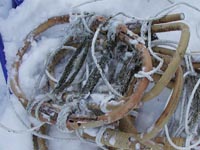
Old fashioned Japanese snowshoes.
|
No one seems to mind; I consider briefly the traditional Japanese snowshoes lying tonari after a young man suggests that I should. But my boots are clearly too large for these, without some serious tying and I'm impressed by the extensive webbing involved in these LL Bean snowshoes. Heck I'd never snow-shoed before and I wanted the whole shebang. Of course upon reflection, when in old Japan,
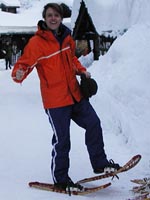 I set out and I was immediately disappointed with snowshoes. That is after I got a van full of waves from girls with fancy hair and Shibuya dispositions. They were cute and I keep thinking, why don't I stop to make conversation with cute girls? I'm usually too busy. The shoes were a disappointment because I wasn't able to stay on top of the snow like some featherlight grasshopper, but rather I seemed as weighty as before, plunging at least as far as my ankles with each step, now with more to lift around my feet. After a few yards I tired of the shoes and I struggled out of one.
I set out and I was immediately disappointed with snowshoes. That is after I got a van full of waves from girls with fancy hair and Shibuya dispositions. They were cute and I keep thinking, why don't I stop to make conversation with cute girls? I'm usually too busy. The shoes were a disappointment because I wasn't able to stay on top of the snow like some featherlight grasshopper, but rather I seemed as weighty as before, plunging at least as far as my ankles with each step, now with more to lift around my feet. After a few yards I tired of the shoes and I struggled out of one.
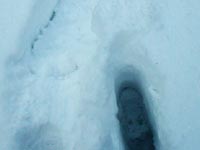
Snowshoes save ankles.
|
My next step proved the value of the entire proposition - my leg sank up to my thigh with only a boot on snow, and my snowshoed boot was only in up to my ankle. As much as I loved the snowloving, I felt I wanted to walk further, see more this time. So I opted for the shoes.
Out the gate, down the road, the path I walked before was buried, snow crested on either side and piled up the middle; the formation resembled nothing more or less than a long white butt-crack. I trode down both sides.
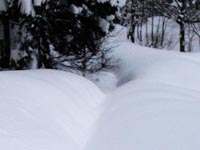
The trail resembled the long white crease between two halves of the same buttocks.
|
There were a few moments of doubt this time; mostly coinciding with some signs notifying me of my distance from my goal: the new "Yama no Yado" annex of Tsurunoyu. It started at 1.5 kilometers with the first sign, then dropped rapidly to 1.2, then after what felt as interminable walking only clocked at .9. It was about the equivalent of a four block walk; I kept thinking of parts of Chicago that I could walk in the same distance. But not with each step pulling a wood frame and fishing net out of a foot deep, two foot long, ten inches wide hole in the snow with plenty of little snow fish caught up in it.
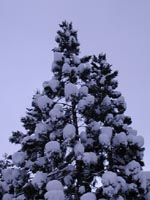
Puffcapped
|
People as a whole learned to ski before they learned to snowboard. Of course there are chronological aberrations to this. But the mass of humanity seems to be in the process of accepting snowboarding now as a more vibrant, faster-paced, accelerated form of an older appreciated hobby.
So is the older culture form reinterpreted. Will people look back on skiing as a classic and revisit it later when it is less popular? Will it be relevant then as a sort of root of snowboarding?
I'm less interested in the particulars of sports similarity here and more I think I concocted this walking in a winter wonderland, as I was tussling with my long term question: what is the cultural context for construction of meaning? Jesus spoke about truth and life as it was on a patch of dry dirt in the desert surrounded by a bunch of despots. Buddha spoke the dharma after ditching his wife and kid and hanging out under a tree in India thousands of years before indoor plumbing, combustion engines and vending machines.
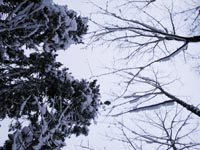
Reaching
You could argue that these folks spoke true words, when life was more simple.
I wondered this as I thought about how few people were walking through the darkened forest with me. Scores of people arrived at Tsurunoyu inn tonight. But rustic for them is to sit by a hearth in the floor of a drafty old fashioned room and eat country soup before sitting in water exposed to a few flakes of snow.
Howard sends me Cold Mountain and what I've read of it tells me, "The truth is outside of the city, outside of the book. The truth is here and I don't know what it is but to say that this is what the height of beauty, clarity is, in nature."
is comma in nature. I write that way now, as I thought it. Beauty clarity is in nature.
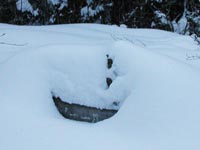
A week later, this sign is covered again. And so I left it.
|
This long-standing romantic ideal. I admire it, I pay homage to it, sometimes it comes to mind when I recycle. But I don't live in nature, I have gladly taken on the technologically-enhanced collectively artificed world as my primary operating environment.
So I could read Cold Mountain, and say, yeah, man, that's really it. I gotta go live with the mountain, me and the mountain, until only the mountain exists. But that's gonna happen anywhere, regardless of where I am in relation to the mountain. It might be looking too specifically at the parable he provides; admire the permanent. I guess that's what I'm searching for!
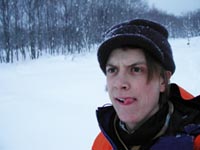
That last bit just occurred to me now; I'll now resume transcribing my thoughts as I crossed the snow back from Yama no Yado, which turned out to be just 12 hotel rooms and a tiny bath, Tanaka-san preparing coals and fish on spits for the coming guests. A tiny bear was taxidermied near the door, a marvellous flyer showed local animals, their feces, and had a picture of a diseased/rabid rat that was truly frightening. I called the young Sato-san over and asked him, do you have more of these flyers? No, everyone wants them. It's a little old, huh? Two years, yeah. Two years is old; I was left to consider that as he scurried off to the office.
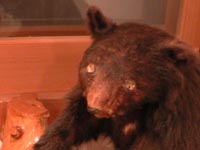
When they're not sleeping for the winter, bears roam the area. Accordingly, local restaurants and hotels often boast at least one stuffed bear. This one was about the size of a chubby nine year old, with unnerving eyes and a slightly deformed snout. A very sad piece.
|
He came back holding a copy of "Hiking in Tohoku" by ?? from the New York Times. A woman took a Lonely Planet guide for all of Japan and used the expert hiking advice to design an onsen wandering itinerary for herself this last summer/fall. I translated the part for him about Tsurunoyu; she had eaten at Yama no Yado, and she was listing what she'd ate. I read him where she mentioned eating excellent nabe, with mountain vegetables, and tofu. He nodded, well there's no tofu but that's okay. While I'd walked all that way to see if there was another spectacular outdoor tub (there was none) finding an error in an article about rural Japan in the newspaper I read most regularly, by talking over the piece in Japanese with someone who lived and worked there tickled me. I had snowshoed a long way to be tickled.
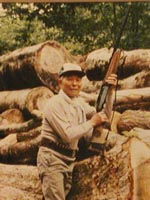
This picture in Yama no Yado immediately caught my eye; you don't see too many Japanese photographed holding rifles. This man was standing as though he'd recently shot a large tree. Sato-san the younger showed me that this man is known as a natural plants expert in the area, someone who can dig up rare mushrooms and bits of edible berries and the like from around here. What about the gun? For now, unexplained.
|
So if Cold Mountain is what you write when you go into nature to find a way to relax and meditate, what would you write now? Where would you go to meditate and relax and see the permanent in today's world? Do you return to Cold Mountain? Can you interpret distinctly common, modern surroundings to serve the same spiritual function? Even in the time it was written Cold Mountain must have been seen as a hermit's testimony; few people back then cared to live off the side of a scraggy cliff. I guess it's always about the people who leave the village but occasionally write letters back asking for donations and telling people how great it is in the world outside. Here I am. What can you write about the Gods from the inside of a video game arcade?
The Pagans are the oldest tradition. And many smart people are practicing pagans today. But most people have gone with the religion update, the vision of spirit as it's been envisioned for the modern society, Judaism/Christianity/Islam. So I look at Mormonism and Scientology, and how they accordingly offer what seems like mostly silly science fiction to many folks more fond of "old time religion" but might actually provide consciousnesses with more appropriate spiritual settings for this day and age.
I'm torn sometimes between being a teacher and a student here. When I was young, I thought, well shit I'll write a new Bible. I'll take all that hokey old crap, distill out the truth, write up the world as I see it and ship it to waiting millions. I scrawled only a bit of that, and I met Amy who thought I might be a kook. It took four years for her to decide I was.
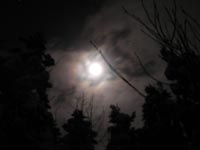
Now, more ready to be a student (with plenty of research writing ahead and behind him) I wonder whether it is more worthwhile for me to honor and revisit the older traditions? The pagan, hill wandering, mountain watching love espousing tradition that precedes all the organized work of man and now seems to be judged often as an impediment to further complexification? Or is it more proper to fully participate in the new world as it exists inevitably today, because only as this inquiring mind inhabits his own world can he generate any sort of useful reflection for today.
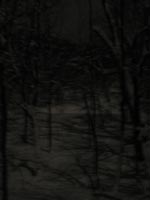 I think to myself, there are so many books written now on the theory of self and religion and the future and all the past and how can I synthesize old and new and make something timeless? There will always be a new sport. We study Cold Mountain because it is well written and compelling and offers us a glimpse of a life we don't lead but a life that is lead with compassion, honor and discipline. Other books have been picked up for mass reading in the time in between. Fortunately, the poem-stones, tree bark and hardened underwear that Cold Mountain was originally scrawled upon survived long enough that it could join the Bible, the sutras, the Koran, Dale Carniege's books, to name a few, about how life might be lead to enjoy it best or most in accordance with the elements.
I think to myself, there are so many books written now on the theory of self and religion and the future and all the past and how can I synthesize old and new and make something timeless? There will always be a new sport. We study Cold Mountain because it is well written and compelling and offers us a glimpse of a life we don't lead but a life that is lead with compassion, honor and discipline. Other books have been picked up for mass reading in the time in between. Fortunately, the poem-stones, tree bark and hardened underwear that Cold Mountain was originally scrawled upon survived long enough that it could join the Bible, the sutras, the Koran, Dale Carniege's books, to name a few, about how life might be lead to enjoy it best or most in accordance with the elements.
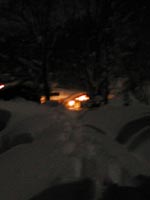 And then I realize it doesn't matter and I feel myself brush up against laughing, after all this wild train of thought and reaching and hoping the brush with laughter comes as a fantastic release. Not so much of a release that I don't retrace my steps; I hope to see these as some learning I've done. But I feel as though I've brushed up against exactly what I was seeking the entire time. And so I go back to walking, somewhere I was between cold mountain and my laptop.
And then I realize it doesn't matter and I feel myself brush up against laughing, after all this wild train of thought and reaching and hoping the brush with laughter comes as a fantastic release. Not so much of a release that I don't retrace my steps; I hope to see these as some learning I've done. But I feel as though I've brushed up against exactly what I was seeking the entire time. And so I go back to walking, somewhere I was between cold mountain and my laptop.
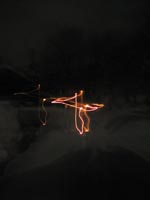
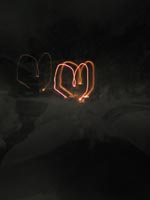 |
|
Taking pictures of a woods by moonlight with an ordinary lens and digital camera was a patience training exercise. You had to stand as still as possible, using your knee or a branch or your shoulder or forehead to hold the camera as still as possible so it could track the little bits of light onto its chips. Of course standing that still while your hands are complaining that they'll soon lose feeling and you've gotten snow in your pants and you've been hiking through all this for three hours makes taking anything a bit impossible. Looking in my little screen after each shot I saw a bit of blur and I decided to go ahead and take blurry pictures - a cross and a heart for starters. And then I figured, what the heck am I doing? So I went and took a bath.
|
|